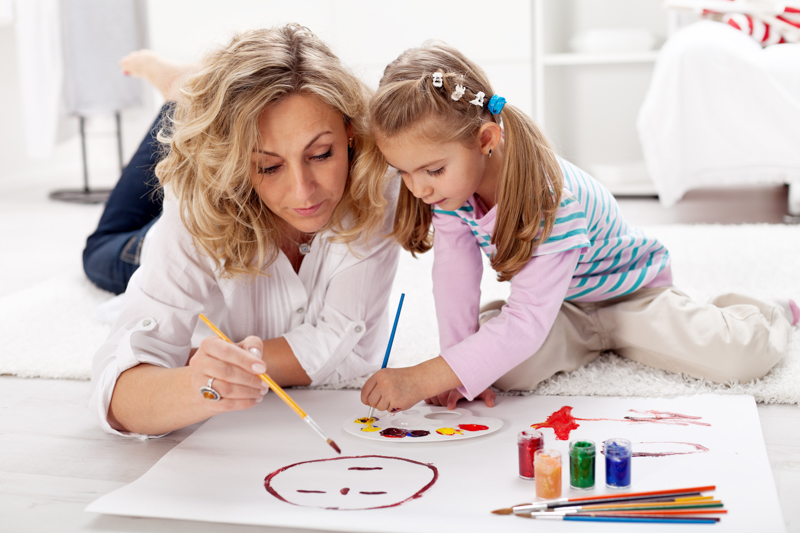Why Play with Your Kids? It Might Make All the Difference!
Ever had a conversation like this with your child?
Daughter: “Hey Mom! Let’s play ponies!”
Mom: “No thanks. I really don’t want to.”
Daughter: “What?! Why not? Don’t you like being with me?”
Mom: “Sure I do, honey. I like you . . . I just don’t like playing ponies. Ugh!”
Daughter: “What?”
Mom: “It just sounds very boring, and I’d rather look at my phone. Sorry.”
I’ll assume that you’ve never had this conversation with any of your children. And that’s a good start. But be honest: have you ever thought or felt something like this? If you were surveyed about your feelings regarding parental involvement, you’d likely be in favor of it. In fact, research shows that most parents feel strongly about the importance of parents spending time with their children.
But as the saying goes, easier said than done, right? And while many parents know that spending time with their kids matters, they may not know that the quality of that time matters too.
Quality Time
A study published in 2015 found that the quality of time a parent spent with their child had a more positive impact than the quantity of time. In other words, simply being with your child is important, but what you’re doing when you’re with them matters even more.
Let me give you an example. I wear a dress shirt, tie, and slacks to work everyday. Some days when I get home from work I change into more casual clothes, but most of the time I’m too lazy and just take off my tie. A few days ago, I arrived home from work and went into my room to change my clothes. My 9-year-old daughter, Molly, followed me into my room and asked if I was changing my clothes. Here’s how the conversation went down:
Molly: “Dad, are you going to change your clothes?”
Me: “Yep.”
Molly: “Yes!” (excitedly)
Me: “What’s so exciting about me wearing different clothes?”
Molly: “Because it means that you’re our dad.”
Me: “But I’m always your dad . . . it doesn’t matter what I’m wearing. If I was wearing a dress I’d still be your dad.”
Molly: “I know, but it just feels different when you’re not wearing your work clothes. It feels like you are here with us and not at work or doing church stuff.”
The moral of this story is not to be more mindful of your wardrobe around your children, but to be more mindful of your mindset when you are with them. As Molly taught me, your kids notice when you’re present but not present, if you catch my drift.
Pause and Reflect
Now it’s your turn to practice!
Map out a typical day in your head and think through every circumstance when you are–or could be–physically with your child. Then try to picture the kind of interaction you usually have in each of those circumstances. Now take it a step further and reflect on how you are typically feeling or what you often think about when you are with your children. How often do you actually play with your children? And by “actually,” I mean no screens (that includes phones) and being fully present.
In order to spend the quality time our children deserve, we need to take time to think about our current parenting practices. Doing this reflective exercise is a good start to becoming a more mindful, intentional, and playful parent.
Yes, I said playful.
Benefits of Play
Maria Montessori once said, “Play is the child’s work.” And truly, children gain so much through play!
The National Association for the Education for Young Children summarized 10 things every parent should know about play. Here are a few of them:
- Children learn through play
- Play is healthy
- Play reduces stress
- Play is more simple and complex than we think
Obviously, kids receive a lot of benefits from playing. While children need plenty of time to play alone, play with siblings, and play with friends, they also need time to play with you. It can be anything from playing make-believe to reading a book to playing board games. Whatever the activity, playing with your child strengthens your bond and allows your child to see a different side of you.
Let’s focus on pretend play for a moment. This kind of play really helps you get on your child’s level. Be silly and creative! Since you may feel a little out of your element, let your child take the lead. (And don’t worry, they’ll let you know when you’re doing the wrong voice for a particular stuffed animal.)
A friend of mine who is a family therapist told me about a father who came to therapy wanting ideas for how to “fix” his 5-year-old son that liked to play with dolls. This worried the father because he thought playing with dolls is girly. Instead, he hoped to play catch with his son. In response, my friend asked him to try playing dolls with his son for a whole week. After trying this for a week, the father reported through tears that he had never felt so close to his son. What’s more, his son even branched out to playing catch (the son’s idea) and other things as well.
How to Play
If you struggle finding the time or the desire to play with your children, here are a few tips to get you started:
- Set your phone down
- Turn your tablet off
- Put your computer to sleep (starting to see a pattern here?)
- Put your own wants on hold
- Clean a little less, play a little more (or you could always make a game out of cleaning)
- Don’t be in such a hurry
- Just go with it!
These tips may seem like little things, but little things can make all the difference! Start small with your goals to improve. Be willing to give up lesser pursuits if necessary. And when you’re struggling to make the time to play with your kids, remember what one mommy blogger said:
[Parent]hood is not a hobby, it is a calling. You do not collect children because you find them cuter than stamps. It is not something to do if you can squeeze the time in. It is what God gave you time for.
So take off your tie, put away your cell phone, and make time to play with your kids today!
For more ideas on playing with your children, check out The Child Development Institute’s tips.






